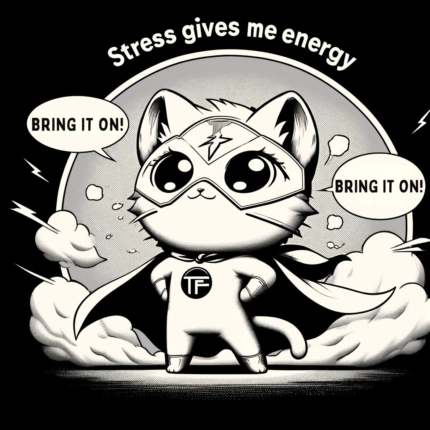In The Upside of Stress, Dr. Kelly McGonigal tells us:
“When you want to perform well, and aren’t in danger, a challenge response is by far the most helpful stress response. It gives you more energy, improves performance, helps you learn from the experience, and is even healthier for you. Artists, athletes, surgeons, video gamers, and musicians all show a challenge response when they’re engaged in their craft or skill. Contrary to what many people expect, top performers in these fields aren’t physiologically calm under pressure.”
Threat response (fight-or-flight response): You are anticipating physical harm.
- Blood vessels – constrict.
- Energy – yes.
- Cardiovascular disease – is increased.
- Aging – can accelerate aging and disease when chronic.
- Emotions – you may feel fear, anger, self-doubt, or shame.
- Rewiring – tends to strengthen the connections between the areas of the brain that detect threats and trigger survival coping.
Challenge response: Since you aren’t anticipating harm, your body responds more like it does during physical exercise.
- Blood vessels – stay relaxed and maximize blood flow.
- Energy – even more energy than a threat response because blood vessels don’t constrict.
- Cardiovascular disease is not associated with an increased risk.
- Aging is associated with superior aging and cardiovascular and brain health.
- Emotions – You may feel a little anxious but also excited, energized, enthusiastic, and confident.
- Rewiring – strengthens the connections between the parts of the brain’s prefrontal cortex that suppress fear and enhance positive motivation during stress.
- In this way, a challenge-response makes it more likely that you will experience stress inoculation due to your experience.
Dr. Kelly McGonigal tells us in the challenge response:
“You release a different ratio of stress hormones, including higher levels of Dehydroepiandrosterone (DHEA), which helps you recover and learn from stress. This raises the growth index of your stress response, the beneficial ratio of stress hormones that can determine, in part, whether a stressful experience is strengthening or harmful.”
“Scientists have studied these different stress responses in many high-stakes situations, and a challenge response consistently predicts better performance under pressure. During business negotiations, a challenge response leads to more effective sharing and withholding of information, as well as smarter decision-making. Students with a challenge response score higher on exams, and athletes perform better in competitions. Surgeons show better focus and fine motor skills. When faced with engine failure during a flight simulation, pilots make better use of plane data and have safer landings.”
“These are just a few examples of scenarios in which a challenge response helps. Importantly, none of these studies showed that performance was enhanced by the absence of a stress response; it was enhanced by the presence of a challenge response. This is not a trivial distinction. If we think all stress responses sabotage success, we may rely on stress-reducing strategies that get in the way of peak performance.”




